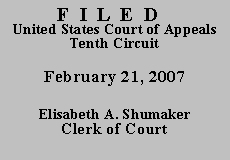

| RUSSELL EUGENE BISNER, |
|
Mr. Bisner was convicted of first-degree murder and aggravated robbery in Utah state court and those convictions were affirmed on direct appeal. See State v. Bisner, 37 P.3d 1073 (Utah 2001). Rehearing was denied on January 3, 2002, and the convictions became final on April 3, 2002, the last day on which he could have filed a certiorari petition with the United States Supreme Court. See 28 U.S.C. § 2244(d)(1)(A); Clay v. United States, 537 U.S. 522, 527-28 (2003) (adding 90-day period in which defendant could seek certiorari); Sup. Ct. R. 13.3 (time to file a certiorari petition runs from the denial of rehearing). As a result, Mr. Bisner had one-year from April 3 in which to file his federal habeas petition, but the one-year period could be tolled during the pendency of a properly filed state post-conviction motion. 28 U.S.C. § 2244(d)(1)(A), (d)(2). Mr. Bisner did not file such a motion until 198 days (from April 3, 2002 to October 18, 2002) after his convictions became final. On October 18, 2002, Mr. Bisner filed a state motion for post-conviction relief, which ultimately ended when the Utah Supreme Court denied certiorari on May 24, 2005. See Bisner v. State, 123 P.3d 815 (Utah 2005) (Table). Mr. Bisner did not file his federal petition until May 19, 2006, some 360 days after the denial of his motion for state post-conviction relief became final. Consequently, 558 days (198 added to 360) passed between the time Mr. Bisner's state convictions became final and the time he filed his federal habeas petition. Because this passage of time well exceeds the applicable one-year statute of limitations, the district court was correct in concluding that Mr. Bisner's petition was untimely.
In addition to arguing that his petition was timely filed, Mr. Bisner also argues for equitable tolling based on the fact that he lacked a law library, legal training, and knowledge of the limitations period, and had only limited assistance from prison contract attorneys. We have limited equitable tolling of the one-year limitations period to "rare and exceptional" circumstances. Gibson v. Klinger, 232 F.3d 799, 808 (2000). In Gibson, we explained:
Equitable tolling would be appropriate, for example, when a prisoner is actually innocent, when an adversary's conductor other uncontrollable circumstancesprevents a prisoner from timely filing, or when a prisoner actively pursues judicial remedies but files a defective pleading during the statutory period. Simple excusable neglect is not sufficient. Moreover, a petitioner must diligently pursue his federal habeas claims; a claim of insufficient access to relevant law, such as AEDPA, is not enough to support equitable tolling.
Id. (internal citations omitted). Mr. Bisner has not shown that any of the three circumstances discussed in Gibson, or any similar circumstances, exist. And the reasons Mr. Bisner offers for equitable tolling are simply inadequate. See id. (holding petitioner's alleged ignorance of AEDPA's statute of limitations is insufficient to warrant equitable tolling); Marsh v. Soares, 223 F.3d 1217, 1220-21 (10th Cir. 2000) (holding delays caused by prison inmate law clerk and law library closures do not justify equitable tolling); Miller v. Marr, 141 F.3d 976, 978 (10th Cir. 1998) ("It is not enough to say that the . . . facility lacked all relevant statutes and case law or that the procedure to request specific materials was inadequate.").
We DENY a COA, and DISMISS this appeal.
Entered for the Court
Paul J. Kelly, Jr.
Circuit Judge